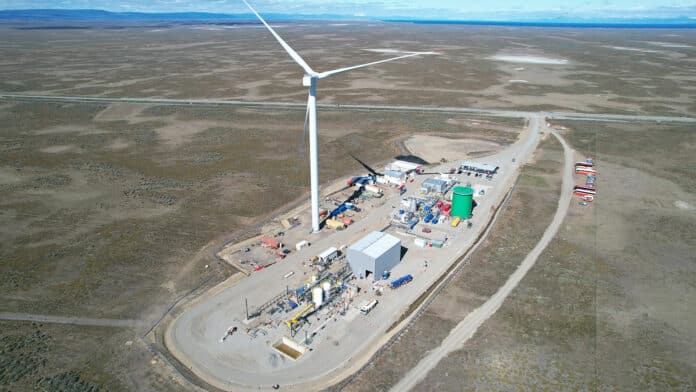Porsche and international partners working with the Chilean operating company Highly Innovative Fuels (HIF) have successfully started the industrial production of synthetic fuels made out of thin air and water. The production of these fuels will take place at the ‘Haru Oni’ pilot plant in Punta Arenas (Chile).
The eFuels made from water and carbon dioxide using wind energy enable the nearly CO2-neutral operation of petrol engines.
The plant takes advantage of the region’s ideal conditions for generating wind energy, which will be used as a sustainable source of electricity to produce synthetic petrol. The eFuels are produced from two raw materials: water and carbon dioxide. Hydrogen is generated via electrolysis, which involves passing a direct current through water. The hydrogen is split off and collected at the negative pole (cathode). Carbon dioxide, the other essential component for producing eFuels, is drawn straight from the ambient air using a process called direct air capture.
Large fans blow air through filters in which the carbon dioxide contained in the atmosphere is deposited. Methanol synthesis causes the H2 and CO2 to react and produce eMethanol (CH3OH), which then goes through MtG synthesis and is converted into synthetic, straight-run petrol.
“Porsche is committed to a double-e path: e-mobility and eFuels as complementary technology. Using eFuels reduces CO2 emissions. Looking at the entire traffic sector, the industrial production of synthetic fuels should keep being pushed forward worldwide. With the eFuels pilot plant, Porsche is playing a leading role in this development,” says Barbara Frenkel, Member of the Executive Board for Procurement at Porsche AG.
“The potential of eFuels is huge. There are currently more than 1.3 billion vehicles with combustion engines worldwide. Many of these will be on the roads for decades to come, and eFuels offer the owners of existing cars a nearly carbon-neutral alternative. As the manufacturer of high-performance, efficient engines, Porsche has a wide range of know-how in the field of fuels,” adds Michael Steiner, a Member of the Executive Board for Development and Research at Porsche AG.
In the pilot phase, Porsche has planned eFuel production of around 130,000 liters (34,342 gallons) per year. After that, the first scaling will take the project in Chile up to a projected 55 million liters (14.53 million gallons) per year by the middle of the decade. Around two years later, the capacity is expected to be 550 million liters (145.3 million gallons).
The south of Chile offers ideal conditions for the production of eFuels, with the wind blowing for around 270 days a year and enabling the wind turbines to operate at full capacity producing the much-needed energy required for the development of eFuels.
